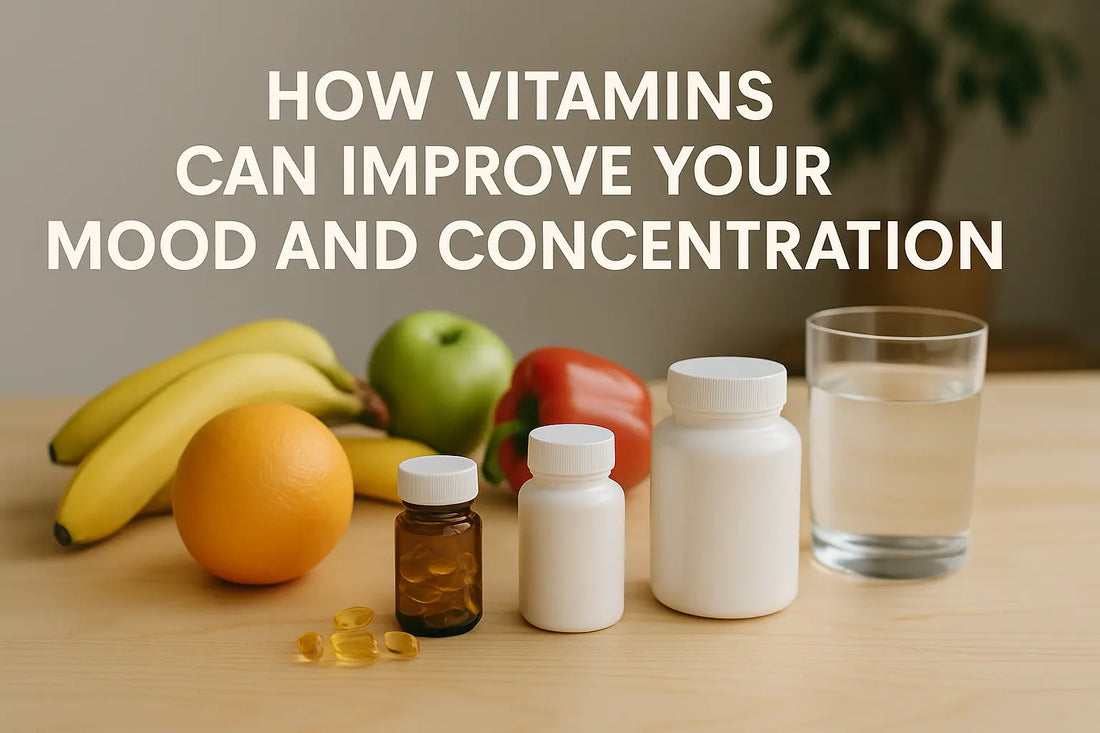
How vitamins can improve your mood and concentration
Jaga
Vitamins are essential micronutrients that not only support physical health but also positively influence the mind. Scientists have long proven that a deficiency in vitamins such as B-group or vitamin D can cause depression, fatigue, and poorer concentration. In this article, we will look at how specific vitamins help improve your mood and mental clarity, as well as give practical advice on diet and supplementation.
The importance of vitamin B1 for the nervous system
What does vitamin B1 do?
Vitamin B1, also known as thiamine, is one of the most important vitamins for maintaining normal brain function. It takes part in producing energy from carbohydrates and supports the function of the nervous system. Thanks to this, vitamin B1 directly affects concentration and emotional balance.
What is the effect of vitamin B1 deficiency?
If the body lacks vitamin B1, it can cause fatigue, apathy, and even depression. Long-term deficiency can lead to concentration difficulties and anxiety. Therefore, it is important to include foods rich in this vitamin in the diet – for example, whole grains, nuts, and beans.
The effect of vitamin D on mood
How does vitamin D affect the brain?
Vitamin D is not only responsible for bone health but also plays an important role in regulating mood. The brain has vitamin D receptors, which indicates that this vitamin is involved in neurotransmitter production – especially serotonin, known as the “happiness hormone.”
How to prevent vitamin D deficiency?
In winter or in regions with little sunlight, vitamin D deficiency is common. To compensate, you can take supplements or eat nutrient-rich foods – fatty fish, egg yolks, and fortified dairy products.
The role of vitamin C in reducing stress
How does vitamin C help against stress?
Vitamin C is a powerful antioxidant that protects the brain from oxidative stress. Studies show that a high level of vitamin C in the blood is associated with lower feelings of stress and anxiety. Moreover, vitamin C promotes the production of dopamine – a hormone linked to motivation and pleasure.
Where to find vitamin C?
Kiwi, lemons, grapefruit, potatoes, and green peppers are excellent sources of vitamin C. If these foods are not sufficiently included in the daily diet, you can use vitamin C tablets or powders.
Vitamin B6 and neurotransmitters
How does vitamin B6 affect the mind?
Vitamin B6 (pyridoxine) is essential for the formation of many neurotransmitters, including serotonin, dopamine, and GABA. All of these are closely linked to mood, sleep, and calming stress responses. An insufficient amount of vitamin B6 can cause anxiety, depression, and restless sleep.
The best sources of B6
- Chickpeas
- Tuna
- Bananas
- Whole-grain bread
Including these foods in the diet can help stabilize emotions and improve concentration.
The effect of vitamin E on brain function
How does vitamin E protect the brain?
Vitamin E is another powerful antioxidant that helps protect brain cells from damage. In older people, its deficiency can accelerate cognitive decline, but in younger individuals, it can improve concentration span and reaction speed.
How to get vitamin E?
Vitamin E is found in olive oil, nuts, seeds, and leafy green vegetables. It can also be obtained through supplements, but is best absorbed from natural food sources.
Conclusion: How to integrate vitamins into daily life?
To maintain a good mood and concentration, it is important to ensure that the body gets all essential vitamins. This means following a balanced diet rich in vegetables, fruits, grains, and protein-rich foods. Supplements can be useful, especially in winter or if there are specific health problems. Remember that vitamins are only one part of a healthy lifestyle – sleep, movement, and stress management are also essential factors.
Frequently Asked Questions (FAQ)
Can you take too many vitamins?
Yes, excessive intake of vitamins, especially A, D, E, and K, which are fat-soluble, can be harmful. It is important to follow the instructions on supplement packaging or consult a doctor.
Which vitamins most affect mood?
The main vitamins affecting mood are B1, B6, B12, C, and D. They are all involved in neurotransmitter production and nervous system function.
Can you find out which vitamin you are lacking?
Yes, blood tests can precisely determine which vitamin is deficient. Also, symptoms such as fatigue, anxiety, or depression may indicate certain vitamin deficiencies.